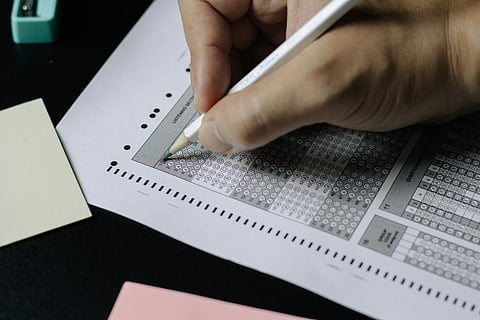
- NEWS
- the EDIT
- COMMENTARY
- BUSINESS
- LIFE
- SHOW
- ACTION
- GLOBAL GOALS
- SNAPS
- DYARYO TIRADA
- MORE

Schools will not be allowed to impose a “no permit, no exam” policy, ending the scourge of students who fall short of cash during crucial periods in their education.
The restriction is now banned after President Ferdinand R. Marcos Jr. signed into law a measure allowing disadvantaged students to take their periodic and final examinations despite having unsettled financial obligations.
In a statement on Saturday, Presidential Communication Secretary Cheloy Garafil said Marcos signed Republic Act 11984, or the No Permit, No Exam Prohibition Act, on 11 March.
RA 11984 covers all public and private basic education (K to 12) institutions, higher education institutions, and technical-vocational institutions nationwide.
All public and private educational institutions found violating RA 11984 will face administrative sanctions from the Department of Education, the Commission on Higher Education, and the Technical Education and Skills Development Authority or TESDA.
Promissory note allowed
RA 11984 mandates all public and private educational institutions to allow disadvantaged students with unpaid tuition and other school fees “to take the periodic and final exams without requiring a permit.”
The new law’s mandate covers the entire school year for K to 12 students.
RA 11984 should be implemented without prejudice to educational institutions’ right and power to require the submission of a promissory note, withhold students’ records and credentials, and use such other legal and administrative remedies available to them for the collection of unpaid fees.
Under the new policy, the Department of Social Welfare and Development is mandated to issue the necessary certificate proving a student’s disadvantaged status due to calamities, emergencies, force majeure, and other justifiable reasons.
The DSWD is required to promulgate the implementing rules and regulations defining a “disadvantaged student.”
It must also set the criteria and requirements for the certifications issued by the different entities involved in effectively implementing the law.
The issuance of certificates by the municipal, city, provincial, or regional offices of the DSWD should follow the law’s IRR.
Go hails law as inclusive
Meanwhile, Senator Christopher Lawrence “Bong” Go lauded the President for signing the law, expecting it to make quality education more accessible.
Go co-authored and co-sponsored the measure in the Senate. Sen. Bong Revilla primarily authored it, and Sen. Chiz Escudero sponsored it.
The new law will take effect 15 days after its publication in the Official Gazette or a newspaper of general circulation.
“Education is a fundamental right and a key driver of economic development. Improved access to education will lead to improved economic opportunities and the overall well-being of our countrymen,” Go said.
He said education is a powerful tool for breaking the cycle of poverty as “it provides individuals with the knowledge and skills necessary to secure stable employment, start businesses, and pursue higher education.”
“By increasing access to education, particularly for marginalized groups, the Philippines can help reduce poverty and inequality,” he said.
The law provides mechanisms and penalties to ensure that institutions cannot prevent disadvantaged students from taking examinations and other educational assessments due to outstanding financial or property obligations, such as unpaid tuition fees.
The DSWD will define who “disadvantaged students” are.
Under the new law, no educational institution shall impose any policy preventing students with outstanding financial or property obligations from taking exams or any form of educational assessment.
